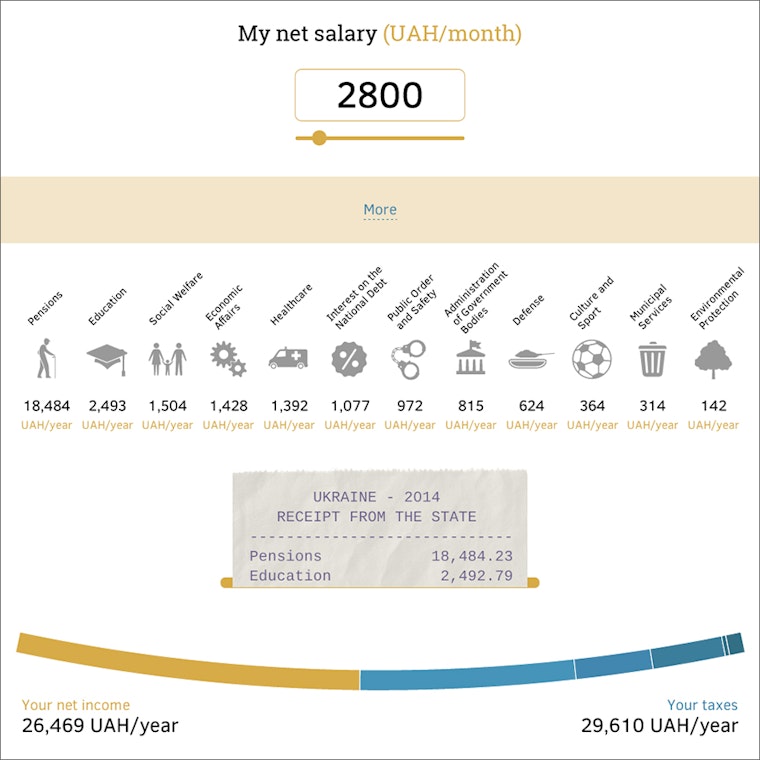Ukrainians to Learn the “Price” of the State
By Dmytro Boyarchuk

The government of Ukraine is notorious for its negligence of rule of law, endemic corruption, pervasive red-tape, and poor performance. But while many deplore the government and its poor accountability, consensus slips away when we ask how to set about reforming it.
One approach is to blame government officials. Another approach holds that government simply reflects the society it governs. On that logic, Ukrainian society must change before the government can reform.
The question has been hard to resolve. The way Ukrainians perceive the government reflects the distortions of the Soviet Union. As Soviet citizens, Ukrainians, as did others in the USSR, lived with constant abuse, ridicule, and disregard. This experience contributed to a kind of societal low self-esteem, resulting in a huge divide separating the government of Ukraine and its citizens.
Lay people rarely speak out or dive into issues, presumably because they tend to underestimate their ability to influence government policies. Recent history has, though, shown how dangerous this mindset can be.
After revolution and Russian belligerence, many people have started to dramatically change their attitude toward government and are showing signs of readiness to become active and responsible citizens. What these people really need now are comprehensible and inspiring educational programs and opportunities for discussing and sharing progressive ideas.
CASE Ukraine’s mission has changed in response. We have started not only conducting research and providing policy advice, but also educating citizens on their basic economic and social rights and responsibilities. We strongly believe that better-educated Ukrainians will elect better governmental leaders by making wiser voting decisions, and will also hold government officials accountable by more often challenging them for their misconduct.
With that in mind, in 2013 we issued a report entitled How Much Does the State Cost, or What Am I Paying Taxes For? [PDF] This report became massively popular, generating hundreds of media articles and causing both astonishment and indignation among a wide spectrum of the Ukrainian population. The success of this report encouraged us to design and implement a large-scale and long-term project to help spread awareness and knowledge about budgetary and taxation matters called The Price of the State.
The inspiration came from the award-winning, similarly named Price of the State project by the Institute of Economic and Social Studies in Slovakia. Perhaps the most crucial element that we have borrowed from our Slovak colleagues reflects the adage “the simpler the better”—easy to understand information will have more impact on ordinary people than any technical analysis could hope to.
The core element of our project is the Price of the State website, which was launched in September 2014. Since then over 60,000 people have visited the website. According to users, its best feature is the Receipt from the State application. This application lets visitors calculate how much in taxes they pay and states precisely what their money is being used for by the state. In the brief time that it has been up, it has been an exceptionally powerful in motivating people to demand more accountability from their government.
Some of the features that will appear on the Price of the State website soon are a pension calculator and a budget simulator. The pension calculator will allow users to estimate how much they will receive after retirement. The budget simulator will give users a better feel of the trade-offs and constraints of the budget process. We are also constantly updating the website with news articles, reports, and infographics.
In deference to the role of social media, we are promoting the Price of the State project on Facebook; its page already has about 5,000 followers. This more lighthearted approach lets us stay in touch with people, directly answer their questions, and gather their feedback.
For the future, we are looking for celebrity endorsers who would be willing to calculate their taxes and share their results with their followers on social networks. We are also going to add another dimension to the Price of the State project—offline opportunities for communication and networking. By reaching out to the Ukrainian public, we want it to embrace its civic identity and opportunities for lasting reforms.
CASE Ukraine is a grantee of the Open Society Foundations.
Dmytro Boyarchuk is executive director of CASE Ukraine, an independent nonprofit organization that specializes in economic research.